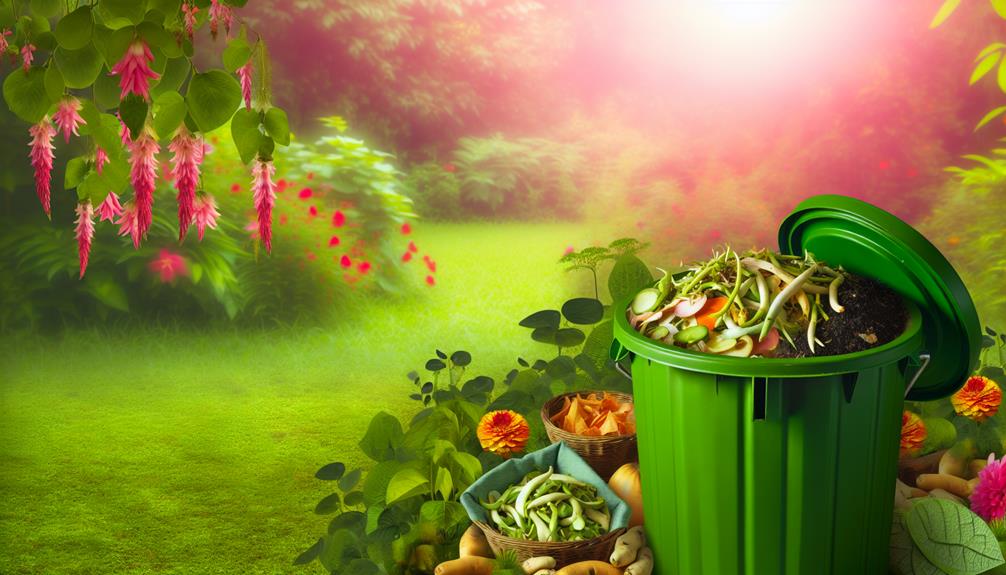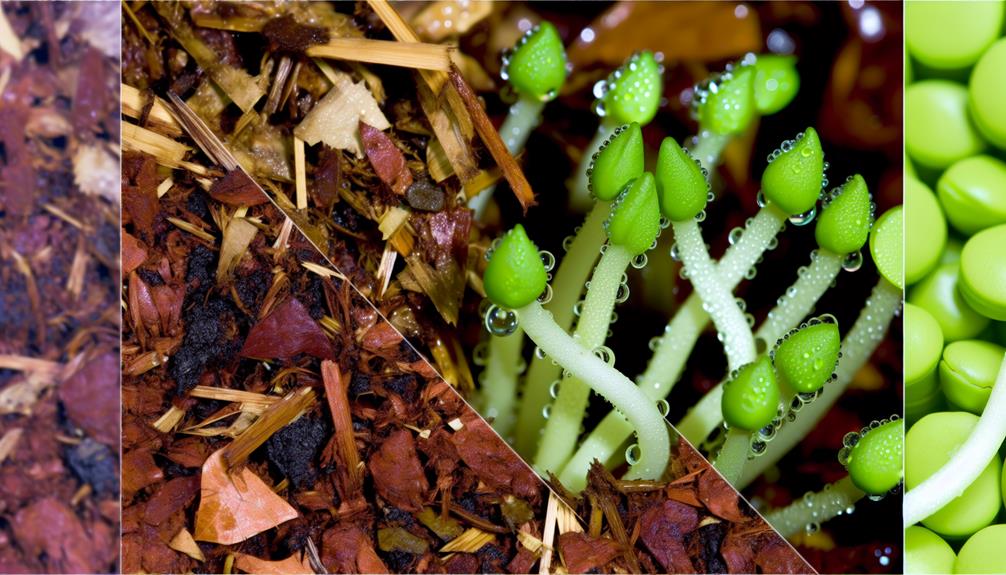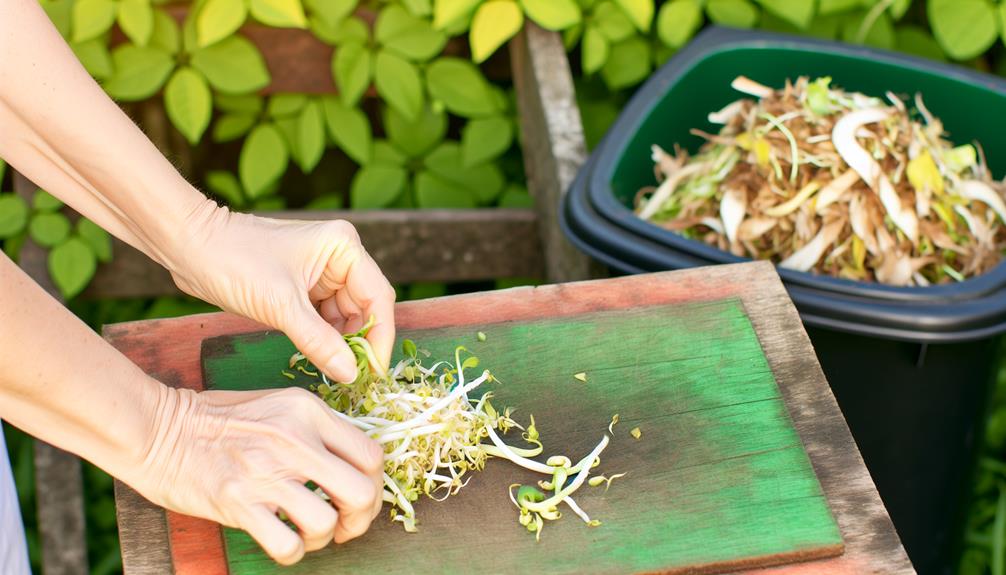

You can definitely compost bean sprouts, and it’s a fantastic way to enrich your garden soil! Bean sprouts are packed with essential nutrients like nitrogen, phosphorus, and potassium, which boost soil fertility and promote healthy plant growth. They break down quickly due to their high water content, speeding up the composting process and improving compost quality.
Just make sure to rinse them well, cut them into smaller pieces, and balance your compost pile with other green and brown materials. With regular turning and moisture management, bean sprouts can help create nutrient-rich compost that supports a thriving garden. Discover more tips to enhance your composting journey!
By composting bean sprouts, you can enrich your garden soil with essential nutrients. This simple practice greatly enhances soil fertility, making your plants healthier and more vibrant.
By adding composted bean sprouts to your garden, you create a sense of community with nature, as you’re recycling organic waste and promoting sustainability. Bean sprouts break down quickly, speeding up the composting process and providing immediate benefits to your soil.
You’ll notice improved soil texture, better moisture retention, and increased earthworm activity. These benefits foster a thriving garden environment, connecting you to a network of eco-conscious gardeners.
Embrace composting bean sprouts to build a greener, more sustainable world while enhancing the vibrancy of your garden.
When composting bean sprouts, you’ll need to carefully manage the moisture balance to keep your compost healthy. Too much water can lead to mold growth, while too little can slow down the decomposition process.

Maintaining the correct moisture balance is essential when composting bean sprouts to prevent them from becoming too soggy or too dry. You want to create an environment where the sprouts break down efficiently without causing issues.
Here are three key steps to manage moisture:
To prevent mold growth in your compost pile, maintain the water content balanced and guarantee proper ventilation. Bean sprouts are high in moisture, so it’s easy for mold to develop if the pile gets too wet.
Make sure you turn the pile regularly to promote airflow, which helps in drying out excess moisture. Mix in dry materials like dried leaves or shredded paper to absorb surplus water and keep the pile from getting soggy.
Remember, your compost should feel like a wrung-out sponge—not too wet or too dry. By monitoring and adjusting the water content, you create an environment where beneficial microbes thrive, ensuring your compost remains healthy and mold-free.
Also Read: Can You Compost Wooden Toothpicks?
You’ll find that bean sprouts break down incredibly quickly in your compost pile, speeding up the process and turning into rich compost in no time.
This rapid breakdown is largely due to their high water content and delicate structure, making them an excellent addition to boost the nutrient levels of your compost.
With bean sprouts, you’re not just speeding up decomposition; you’re also enriching your soil with valuable nutrients for your garden.
When composting bean sprouts, their high water content and tender structure cause them to decompose remarkably quickly. You’ll find that they break down much faster than tougher vegetables, making them perfect for your compost pile.
Here’s why bean sprouts are ideal for rapid decomposition:
By composting bean sprouts, you’ll create a nutrient-rich compost that greatly enhances soil fertility. Bean sprouts decompose rapidly, breaking down within a few weeks thanks to their high water content and delicate structure. This quick decomposition process releases essential nutrients back into your compost pile, such as nitrogen, which is crucial for plant growth.
When you add this compost to your garden, plants will benefit from the rich array of nutrients, leading to healthier growth and more vibrant blooms. You’ll notice that your soil becomes more fertile, with improved texture and moisture retention. This means your plants will have better access to the nutrients they need, fostering a more robust and thriving garden community.
Also Read: Can You Compost Worms?
Start by rinsing the bean sprouts thoroughly to remove any dirt or pesticides. This step guarantees you’re adding clean material to your compost pile, promoting a healthier composting process.

Next, follow these steps to prepare them properly:
After preparing your bean sprouts, focus on balancing your compost pile to guarantee efficient decomposition.
You’ll want to mix your green materials, like the bean sprouts, with brown materials, such as dried leaves or cardboard. This balance is vital because green materials provide nitrogen, while brown materials offer carbon. Aim for a ratio of about 2:3, green to brown.
Turn your pile regularly to aerate it, ensuring oxygen reaches all parts, which speeds up the decomposition process. Keep the pile moist, but not too wet, by adding water when necessary.
Also Read: Can You Compost Rotten Bananas?
Encountering issues with your compost pile can be frustrating, but identifying and addressing these problems early will keep your composting process on track.
Here are three common issues and how to solve them:
Incorporating nutrient-rich compost into your soil can greatly enhance the growth and health of your bean sprouts. By mixing compost into your garden, you provide essential nutrients like nitrogen, phosphorus, and potassium, which are crucial for robust growth. Compost improves soil structure, enabling better water retention and aeration, which bean sprouts love. When you use compost, you’re creating a nurturing environment that promotes stronger root systems and healthier plants.
Start by adding a layer of compost to your garden bed, and mixing it well with the existing soil. This blend guarantees that nutrients are evenly distributed.
As your bean sprouts grow, continue to enrich the soil with compost, fostering a sense of community and shared growth in your garden. This practice not only benefits your plants but also connects you with nature.
Also Read: Can You Compost Cantaloupe?
Composting not only enriches your garden but also greatly reduces waste and greenhouse gas emissions. When you compost bean sprouts, you’re actively participating in creating a healthier planet. It’s more than just a gardening activity; it’s a powerful environmental action.
Here’s how composting helps:
Join the composting movement and make a difference!
Get started with composting bean sprouts, and you’ll not only enrich your soil with valuable nutrients but also contribute to a more sustainable environment. Bean sprouts decompose quickly, adding essential moisture and organic matter to your compost pile.
Just remember to balance your compost with other materials, and you’ll have rich, fertile compost in no time. Start composting bean sprouts and watch your garden thrive, knowing you’re making a positive impact on our planet.
